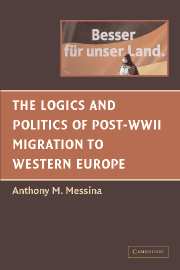Book contents
- Frontmatter
- Contents
- List of Figures and Tables
- Preface and Acknowledgments
- The logics and politics of post-WWII migration to Western Europe
- 1 Introduction
- 2 The Origins and Trajectory of Post-WWII Immigration
- 3 The Organized Nativist Backlash
- 4 Immigration and State Sovereignty
- 5 The Logics and Politics Of a European Immigration Policy Regime
- 6 The Domestic Legacies of Postwar Immigration
- 7 The Logics and Politics of Immigrant Political Incorporation
- 8 Conclusions
- References
- Index
6 - The Domestic Legacies of Postwar Immigration
Citizenship, Monoculturalism, and the Keynesian Welfare State
Published online by Cambridge University Press: 05 June 2012
- Frontmatter
- Contents
- List of Figures and Tables
- Preface and Acknowledgments
- The logics and politics of post-WWII migration to Western Europe
- 1 Introduction
- 2 The Origins and Trajectory of Post-WWII Immigration
- 3 The Organized Nativist Backlash
- 4 Immigration and State Sovereignty
- 5 The Logics and Politics Of a European Immigration Policy Regime
- 6 The Domestic Legacies of Postwar Immigration
- 7 The Logics and Politics of Immigrant Political Incorporation
- 8 Conclusions
- References
- Index
Summary
A citizen is by definition a citizen among citizens among countries. His rights and duties must be defined and limited … by the boundaries of a territory….
(Hannah Arendt 1970: 81–2)Rights that used to belong solely to nationals are now extended to foreign populations, thereby undermining the very basis of national citizenship.
(Yasemin Nuhoğlu Soysal 1994: 137)The porousness of borders is a necessary while not sufficient condition of liberal democracies. By the same token, no sovereign liberal democracy can lose its right to define immigration and [immigrant] incorporation policies.
(Seyla Benhabib 1999: 713)As we saw in the previous chapter, interdependence sovereignty is not a zero-sum condition. Initiatives to regulate, restrict, and even communitarize some facets of immigration do not signal that European states have ceded or involuntarily suffered a loss of sovereignty. Specifically, they do not indicate that the capacity of the immigrant-receiving states to define and achieve their self-interests in this important and contentious public policy domain has irrevocably eroded.
What, then, of the widely propagated thesis that, regardless of the strength of its direct effects, mass immigration has indirectly undermined domestic institutions and deeply embedded norms of national identity, belonging, and inclusion? Specifically, what should we make of the claims of some scholars that post-WWII migration has facilitated irreversible change in the norms and practices underpinning national citizenship, the sociocultural foundations of the nation-state, and domestic social welfare regimes (Feldblum 1998; Heisler 1986; Jacobson 1997; Joppke 1999b; Koslowski 2000: 91–2)?
- Type
- Chapter
- Information
- The Logics and Politics of Post-WWII Migration to Western Europe , pp. 170 - 193Publisher: Cambridge University PressPrint publication year: 2007



